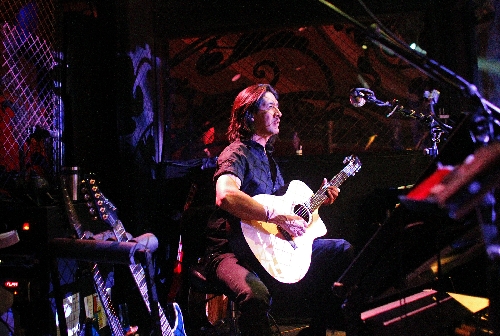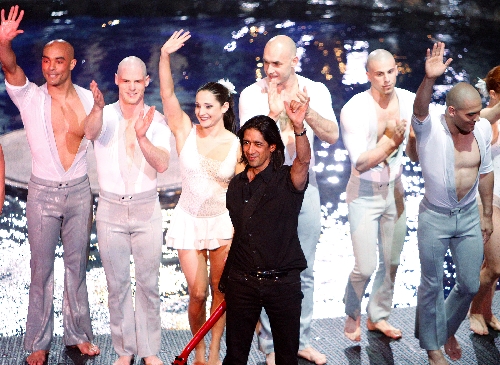Hawaiian-born guitarist plugs into audience with hot licks, rapid ax changes
Mundo Juillerat's back arches as his fingers shred the neck of his Washburn electric guitar.
He's in his "Taco Stand," serving up some hot licks and cool riffs to the audience at a recent performance of "Le Reve -- The Dream" at Wynn Las Vegas. A black pad labeled "Buttkicker" vibrates under his feet, mimicking the feel of the amplifier that he does not have but so closely associates with playing guitar.
On stage, his amp pulses and moves the air around him. The sensations make him lighter, freer on the guitar strings. In "Le Reve," there is no need for an amp. Juillerat is not onstage. He's in the dark "Taco Stand" booth in the audience, playing his guitar. His music is mixed by an engineer in a sound booth before it's piped, rich and full, into the theater.
Juillerat, 48, bobs his head until his Joe Satriani moment comes to an end. Then he becomes an acoustic guitarist, putting his electric down and picking up an acoustic. During one show, he will switch between four guitars more than 20 times.
Since 2008, when he joined the show, this has been the stuff Juillerat's dreams are made of.
Juillerat moved to Las Vegas in 1991 to play in a lounge band that had a recurring gig at Cleopatra's Barge in Caesars Palace.
Though he graduated from high school in Reno, Juillerat is a Hawaiian boy at heart.
Born on Oahu, he grew up in Kahaluu, where he lived in Navy housing with his mother and father. His dad, a submariner, was at sea for months at a time so Juillerat's mother took up hula dancing to occupy her time. It was at hula class that Juillerat first picked up a ukulele. He was about 3 or 4 years old.
"I hung out and would play the ukulele during the breaks," he says. "My aunties taught me my first few chords."
The ukulele led to guitar, for which Juillerat had a natural affinity. For the first few years of his budding career, he played his music by ear. After a few years of playing professionally, however, he realized he needed a music foundation, so he attended the Guitar Institute of Technology at Musicians Institute in Los Angeles.
Juillerat, says friend and ex- band mate Mark Adams, is a musician's musician.
"He's a great player. He has what we refer to in the business as a really good groove," Adams says. "When he's playing rhythm guitar, once you start playing with him, it just feels good. It's the way he plays. It makes you want to bop your head. That's everything for us, a lot of musicians don't get that."
He's also a problem-solver, says friend, mentor and brother-in-law Jerry Lopez. Lopez, the founder of the band Santa Fe and the Fat City Horns, met Juillerat in the 1990s.
He hired him to play guitar in "Storm," which played at Mandalay Bay for just more than a year. Juillerat not only had the music chops, Lopez says, he also had the ability to trouble-shoot problems and come up with solutions.
"A lot of times, when you're starting a new show, everybody's cool when things are good," Lopez says. "But when the bombs are going off, who's going to step up? There are a lot of really hair-raising moments in a show especially when it's just opening up. Most people would fold. Not Mundo."
In 2002, Juillerat married Lopez's sister-in-law. They have one son.
You will never meet a nicer guy than Juillerat, says Adams, a drummer. He met Juillerat in the '90s when both played with a lounge band at Cleopatra's Barge. They immediately formed a solid friendship.
"He has this warm charm about him," Adams says. "Once you meet him, you feel like you know him."
His "Le Reve" gig is only one part of his career. Juillerat fronts his band, Hot Club of Las Vegas, a Gypsy jazz band. They plan to release a CD soon. He also promotes guitars and equipment for U.S. Music Corp., which sponsors him.
Juillerat tries to foster a strong musical community, too. Last year, he started the Vegas Unplugged festival, a showcase for acoustic guitarists. He's planning another festival for October. The plan is to build it into something big for the music community, he says.
"I want to leave a legacy," Juillerat says.
Contact reporter Sonya Padgett at spadgett@reviewjournal.com or 702-380-4564. Follow @StripSonya on Twitter.























